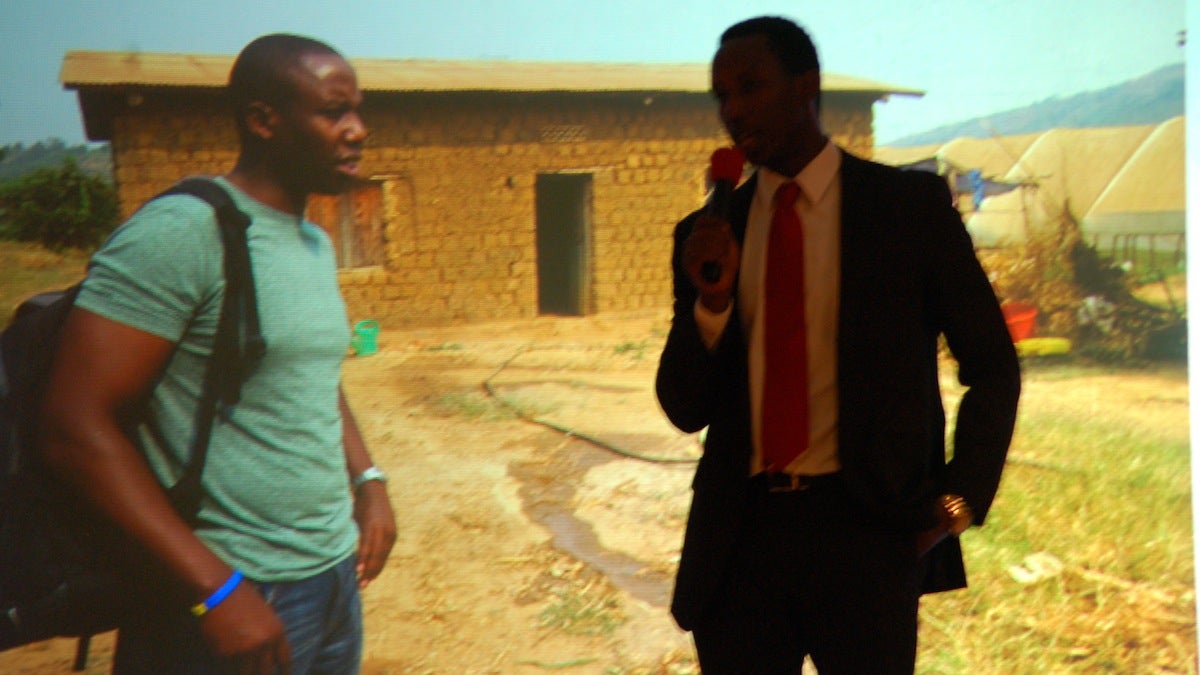Rwandan genocide survivor speaks at Chestnut Hill College

Emmanuel Habimana, stands next to a projected picture of himself visiting his native village. (Jon Campisi/for NewsWorks)
It’s not easy for Emmanuel Habimana to talk about the unspeakable horrors that occurred during the Rwandan genocide back in 1994.
But he continues to do so, he says, because he feels it’s important to keep alive the memories of those who were slaughtered, including his parents and siblings, during the 100-day campaign of terror perpetuated by the Hutu majority against ethnic Tutsis.
Raising awareness
Habimana, who was just nine years old when his father was murdered by a soldier and his mother and four siblings were slaughtered in a mass killing after being discovered hiding in a school, today travels the United States to raise awareness of the genocide that took the lives of an estimated 500,000 to one million ethnic Tutsis.
The filmmaker, public speaker and activist visited Chestnut Hill College on Wednesday night to bring his message of peace of forgiveness.
“It’s been a long process, very challenging,” Habimana told a small crowd in the school’s library during an evening presentation. “We hope that someday the sun will rise up over our heads.”
Today, Habimana is a 20-something who thinks about returning to his education — he previously went through primary school, high school, and two years of university — but for years he was a young man who was trying to come to grips with what happened during his childhood.
Like any other child, Habimana was confused as to why those he once called neighbors and friends would suddenly turn on his fellow Tutsis, unleashing a campaign of terror marked by rapes, shootings and machete killings.
‘It didn’t make sense’
During his presentation, Habimana projected onto a screen a picture of a man, presumed to be a Tutsi, whose nose was being measured with a device held by a man belonging to the majority Hutu sect.
Habimana drew contrasts between what was being depicted in that image and the activities perpetuated by the Nazis in Germany during World War II to support their ill-gotten notion of ethnic cleansing and race purification.
Habimana said his goal is to focus on our similarities as a people rather than our differences.
“It’s frustrating, overwhelming, because the same thing keeps happening somewhere else,” said the soft-spoken young man, who often apologized throughout the lecture for his accent.
English is only the latest language he has picked up, he said humbly.
Habimana said like others who have been subject to prejudice and discriminatory hatred, he did not decide to come into this world as a member of a certain ethnicity, in his case, as a Tutsi.
“I didn’t choose to be born that way,” he said. “I found myself on this earth.”
For Habimana, the problems started when he was young. He recalled being told he had to stop playing with the neighbor boys because they were not Tutsis, but rather Hutus.
It was confusing to him because, being raised in a small rural village, he was accustomed to interacting with neighbors on a regular basis.
“It didn’t make sense to me,” he said.
A witness to tragedy
Habimana recalled being a young boy and witnessing his father being taken and beaten simply because of his ethnicity.
He also remembered hiding in sugar canes, trying to protect his siblings from the violence that eventually came their way.
He was spared some of the most horrific things to befall his family.
“I didn’t witness the deaths of my mom and my sisters, who were beautiful,” he said.
Still, he has a pretty good idea what unfolded, since it was common knowledge that the offending Hutus were known to first rape women, and then kill them.
“It’s extreme, it’s inhuman,” he said. “And most of our women have been taken that way.
“Our moms, they took away their dignities.”
Miraculously, Habimana was able to escape to the African nation of Congo, where he lived until the end of the Rwandan genocide.
He almost died of starvation, as many of his countrymen did, but was able to survive.
‘A struggle’ to move on
Today, he is a pillar of inspiration, say those at Chestnut Hill College who secured his visit.
In 2010, Habimana began his filmmaking career by co-directing, “Komora: to Heal,” a documentary about orphan survivors of the Rwandan genocide.
During a question-answer period at the college, Habimana was asked how he finds the strength to go in in the face of such past horror.
“It’s a struggle, it’s a fight,” he said. “I think you are responsible for yourself and you try to move on.”
He said his inspiration to press forward is the knowledge that he can help preserve the memories of his loved ones and other Rwandans who died in the genocide.
“I hope someday I reach my goals,” he said. “I haven’t been there yet.”
April 7 marks the 20th anniversary of the start of the Rwandan genocide.
WHYY is your source for fact-based, in-depth journalism and information. As a nonprofit organization, we rely on financial support from readers like you. Please give today.




